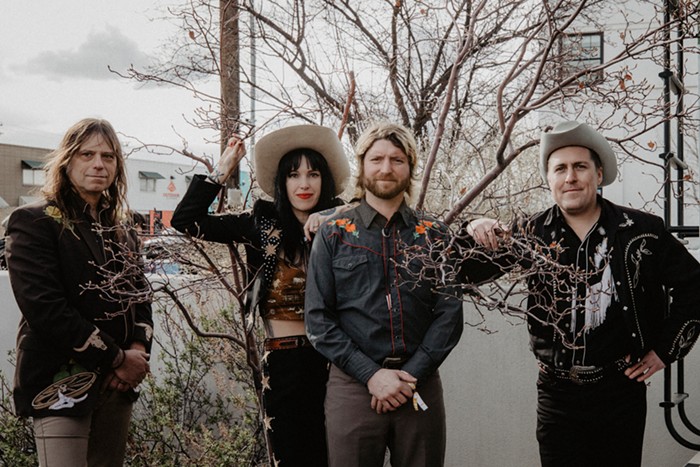Radiohead is the most artistically significant band of the past 20 years, maybe 30 years, and maybe ever. And no band since their old tour mates in R.E.M. has the capacity to divide its fans on the crucial question: What is their best record? You have your Bends crusties, OK Computer hardliners, the Kid A/Amnesiac Damascenes, the In Rainbows generation, et al. Like the elephant in the old Sufi parable, Radiohead feels like a completely different animal depending on which of us blind people is doing the groping. Rather than contribute another essay on the band’s indisputable significance/importance/excellence, we asked some Radiohead freaks to pick the one song that captures the quintessence of the band’s power. SEAN NELSON
“The Tourist,” OK Computer (1997)
“The Tourist” represents some kind of apotheosis for “the grand album finale.” Closing Radiohead’s consensus magnum opus, OK Computer, its languorous pace, wistful mood, restrained guitar pyrotechnics, and tolling glockenspiel (or is it a triangle?) coalesce into something worthy of Pink Floyd circa Atom Heart Mother or Meddle. I’ve never been a fan of Thom Yorke’s neurasthenic whine, but on “The Tourist,” the song’s grandiose arc enables him to strain into his range’s sweet spot. He delivers the lines with the sort of gravity and poignancy that make this listener—someone who respects Radiohead and their music more than he enjoys them—understand what all the fuss is about. Also, the first time I heard “The Tourist” was when a server on whom I was crushing put OK Computer over the bar’s PA, and the song’s dreamy drift and romantic lilt intensified my desire for her. So there’s that, too. DAVE SEGAL
“Palo Alto,” Airbag/How Am I Driving?(1998)
Call me sentimental, but I love rock bands, and Radiohead recorded this astonishing B-side in the wake of the outsized (though still never sufficiently massive) success of OK Computer. Its recording is captured in the documentary Meeting People Is Easy, which I basically watched every day for months while waiting and hoping that the next record would somehow combine the cathartic aggression and wit of this song with the more expansive textures and shapes of OK. As we all know, Kid A and Amnesiac (which I still think of as “the new ones”) did nothing of the kind, instead ushering in the next two decades of extrapolated, decentralized electronic space alienation music as the defining sound of the age. Which was perfectly fine. However, in “Palo Alto,” you hear the last explosive gasp of Radiohead as noisy, obstreperous, guitar-driven British rock band. And every time they announce a new record, I secretly dream they’ll become one again. SEAN NELSON
“Morning Bell,” Kid A (2000) and Amnesiac (2001)
There are two versions of “Morning Bell”—one is on Amnesiac and the other on Kid A. I don’t care much for the former, which has no beat and the gothic mood of Depeche Mode’s Black Celebration. But the latter and first version captures a marvelous feeling that I think is best described by this line in James Joyce’s Finnegans Wake: “It darkles, (tinct, tint) all this our funnaminal world.” The Kid A version of “Morning Bell” has a beat that stutters and a mood that darkles like a Bernard Herrmann score. And in the manner of a blues tune, it’s mostly composed of triplets, with the second line repeating the first (“Where did you park the car?/Where did you park the car?”). But unlike a blues tune, the third line does not resolve the first two (“Clothes are all over the furniture...”). In a standard blues stanza, line three brings it all together (for example: “My name is Piggly Wiggly, got-a groceries all on my shelf/My name is Piggly Wiggly, got-a groceries all on my shelf/Got a sign on my door, ‘You can come in and help yourself’”). The lines in “Morning Bell” go from a question about a missing car to a messy room to a mischievous thought to the eruption of a fire drill to the moments before a murder. One stanza, the darkest in the work, has three repeated lines. This is a hypnagogic blues tune. CHARLES MUDEDE
“2+2=5,” Hail to the Thief (2003)
Despite relentless and undying respect for Radiohead, Hail to the Thief was the last album of theirs I truly loved, and its lead-off track, “2+2=5,” is an all-time favorite. It’s dark, disaffected, and driving, speaking directly to the righteous anger I was feeling toward the Bush administration at the time (which I once thought was the worst this country would ever face) and a seemingly complacent populace content to accept whatever was thrown down the pipeline; the lyrics reflected on our country’s political state—explicit criticism of Bush winning the presidency in the 2000 election even though Gore earned the popular vote—while referencing George Orwell’s 1984 and mindless denizens who accept implausible truths even when logic and fact prove otherwise. The band was also touring behind Hail to the Thief the first time I saw them live, and I’ll never forget the explosive way they opened the set with this track. It reminds me that Radiohead once had teeth that their more recent output seems to lack. The song and album are just as relevant today as when they grabbed me the first time. And we still aren’t really paying attention. LEILANI POLK
“Bodysnatchers,” In Rainbows (2007)
In my mind, Radiohead will always own two subjects: the paranoid individual lashing out against society, and love as soul-eating obsession. “Bodysnatchers” from In Rainbows exemplifies the former—it’s a perfect expression of the particular rage that mopey kids allow themselves to feel once a month. In the beginning, a heavily distorted, hard rock riff and a nervous hi-hat add a lot of nervous energy to Thom Yorke’s frustrated murmur. Yorke sounds like he’s about to burst into some kind of paranoid thunderstorm, and then, 40 seconds later, he does. His voice rises into a full-on Brit-punk hissy while Jonny Greenwood lays an apocalyptic riff over the top of an already apocalyptic rhythm guitar part. Then a siren noise wraps around the whole thing as Yorke sings, “I have no idea what I am talking about/I’m trapped in this body and can’t get out,” and suddenly the song’s a full-blown paranoia tornado. Despite all the cinematic gestures, the tornado feels very internal. The speaker would tear up the whole fucked-up world if he could only get out of his own head. RICH SMITH


















